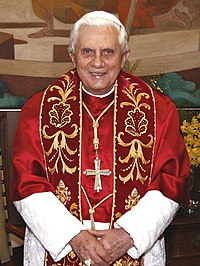 Pope Benedict may have gotten himself in trouble, again. Or at least that's what would seem to be implied by an article -- headlined "Pope Questions Interfaith Dialogue" -- from the New York Times' new Rome correspondent, who quotes the following from a letter the Pope wrote to an Italian politician:
Pope Benedict may have gotten himself in trouble, again. Or at least that's what would seem to be implied by an article -- headlined "Pope Questions Interfaith Dialogue" -- from the New York Times' new Rome correspondent, who quotes the following from a letter the Pope wrote to an Italian politician:“an interreligious dialogue in the strict sense of the word is not possible.” In theological terms, added the pope, “a true dialogue is not possible without putting one’s faith in parentheses.
My guess is that -- while I doubt that the Pope is being misquoted here -- he is, as it was in the controversy about his 2006 Regensburg lecture, being a bit misunderstood. This Pope has not yet learned (and maybe he never will) that for someone in his station it is impossible to try and make subtle statements about something as sensitive as whether Catholicism sees other religions as legitimate or not. My guess is he was trying to make a statement about exactly what is possible in inter-religious dialogue, not whether inter-religious dialogue is a good thing or not (which, based on his meeting with Muslim leaders earlier this month, for example, he seems to be in favor of).
As a Jewish clergyperson whose primary occupation at moment is training Christian ministers in pastoral and spiritual care these kinds of issues are anything but theoretical. I work with students who may believe that true healing can only come through Jesus, a belief I certainly don't share. Can I come to care about the learning and growth of a student who believes this way, and even help them to apply it? The answer has to be, yes, or else I would have to quit my job. But that doesn't mean it is easy for me. I am helped by the thought that I care about the well-being of all members of humankind, Jew and non-Jews, and want them all to know what it is like to be treated as if they are made בצלם אלוהים/btzelem elohim -- in the image of God -- especially when they are sick or helpless. But, as I said above, it is not always easy.
There is no doubt that the fate and health of the Jewish people -- the people who brought the concept of בצלם/btzelem to all the world -- has a special and dear place in my heart. I became a rabbi most of all to be in service to that people and to be a force working for their health and survival and for the health and survival of their Holy tradition -- of Torah.
As I stated above, my current professional life is primarily among non-Jews. I know that I still believe I am serving the Jewish people in that work, if indirectly. But I also know that I feel a hunger for a more direct involvement and that I will be searching for ways to bring that into my life in the coming years and months. That is in large part why it was such a gift to me this year to be able to spend two months in Israel. I am deeply grateful for that.


3 comments:
Thanks for your thoughts on this Alan. The Pope has likely been too nuanced again. I have a similar feeling to the one you express being a Rabbi among predominantly Christian students. I also feel distanced from my tradition, but a similar sense of serving the particular by being faithful to the whole. I also have that add sense of longing to return.
I'm guessing you're right, that the subtlties of the Pope's remarks are not easily grasped by the media. (I haven't found them to read yet.) During the six years that I taught literature and history to Orthodox Jewish students, I spent a lot of time on/in interreligious dialogue, and tried to convey how important it is that we maintain both integrity with respect to our own beliefs and openness to those with whom we differ. I loved how much I learned from those students.
I was really struggling with the spelling of subtleties there! It still doesn't look right.
Post a Comment